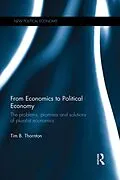This book offers an explanation as to why economics has become so determinedly non-pluralistic, but much attention is also given to exploring and evaluating promising strategies for reform. Strategies examined include working from inside economics, politics and other social science departments, and in establishing dedicated sectors of political economy. Along the way the reader will learn about the worldwide movement of students pushing for greater pluralism in economics, encounter some dramatic case studies in intellectual suppression, and generally gain a fuller sense of the nature and direction of contemporary economics.
Autorentext
Tim B. Thornton is a lecturer in the Department of Politics and Philosophy, and the Institute of Human Security and Social Change at La Trobe University, Australia, where he teaches political economy and convenes La Trobe's Bachelor of Politics, Philosophy and Economics and Master of International Development degrees. Tim has a PhD in economics from La Trobe University and a Master of Arts (International Development) from Monash University, Australia. He has published regularly on the topic of pluralism in economics, the nature and direction of contemporary economics and the relationship between economics and other social sciences.
Zusammenfassung
The discipline of economics has been increasingly criticized for its inability to illuminate the workings of the real world and to provide reliable policy guidance for the major economic and social challenges of our time. a A central problem in contemporary economics, and a problem from which many of its other failings flow, is its lack of plurality. By a lack of plurality it is meant that contemporary economics lacks diversity in its methods, theories, epistemology and methodology. It is also meant that economics has become far less interdisciplinary. From Economics to Political Economy offers an explanation as to why economics has become so determinedly non-pluralistic, and also gives considerable attention to exploring and evaluating promising strategies for reform. These strategies include developing a pluralist economics under the label of 'political economy' within other social science departments (such as departments of politics). Along the way the reader will learn about the worldwide student movement seeking greater pluralism in economics, encounter some dramatic case studies in intellectual suppression, gain a fuller sense of the nature of contemporary economics and explore the relationship between economics and other social sciences.This book is of interest to any social scientist, particularly those with interests in economics and politics.
Inhalt
Introduction
2. The sociology of scientific knowledge
3. The changing face of economics
4. Economic pluralism and economics as a science
5. Orthodoxy, heterodoxy and political economy
6. The global student movement for pluralism
7. Economics textbooks
8. Economics departments
9. Reform from within
10. Reform from without
11. Hybrid strategies
12. The market for economic knowledge
13. The three purposes of economics
